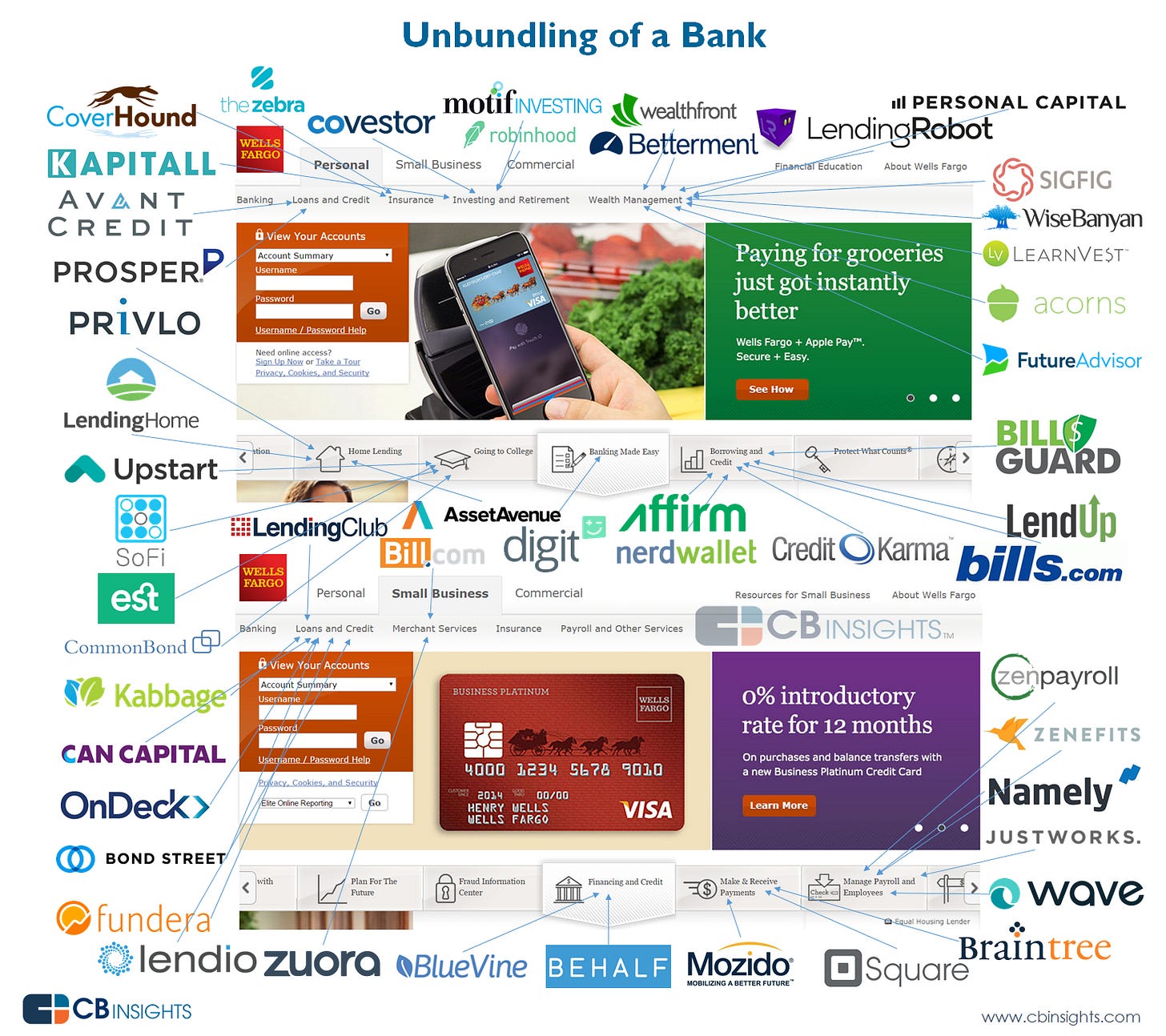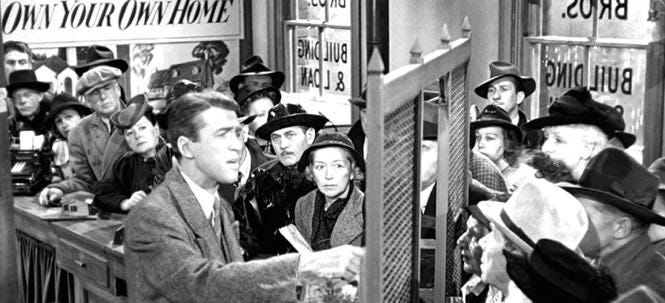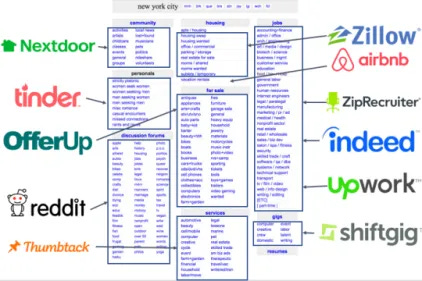The unbundling of banks
By 2030 we won’t ask why traditional banks are gone, we will wonder why they hadn’t disappeared years ago.
Banks are truly awful. Ignored or forgotten most of the mega banks of 2021 only exist due to the socialization of their losses in 2008, and being propped up by preferential lending from our central bank today. Despite or more likely because of this preferential treatment by the government, banks have largely failed to innovate while abusing their customers with high unnecessary fees for increasingly commoditized services. Interacting with the mega banks summons a feeling of nostalgia as you’re plunged into an antiquated era where it is still acceptable to do commerce via dead trees and fax machines while other companies are regularly launching self landing rockets into space. Many interactions with these dinosaurs will require you to enter one of their many no doubt expensive locations where despite being near empty will provide you a level of customer service that would make a DMV employee blush.
By 2030 we won’t ask why traditional banks are gone, we will wonder how they lasted so long.
If banks are the dinosaurs then fintechs are the mammals. Fintechs are usually small and specialized businesses undergoing adaptive radiation while the current dominant lifeforms fail to adapt to a changing world. Welcome to the Eocene Epoch.
After reading the above it should surprise you that banks do still exist and provide a variety of services people voluntarily consume. Today banks are essentially a bundle, a bundle being a convenient form of distribution for goods and services. It made sense prior to the microprocessor and internet that you’d have a relationship with your local bank where they would know both your character and finances. This bank would provide a one stop shop for earning money on your savings, investing for retirement, and financing your home or car.
Bundling and unbundling
“I said, really just to end the conversation, Gentlemen, there’s only two ways I know of to make money: bundling and unbundling.” - Jim Barksdale
As mentioned above bundles are just a convenient form of distribution for goods and services. My hypothesis is that bundles largely arose out of distribution restraints not out of customer preference. Media bundles such as broadcast and cable television, newspapers, or music are all classic examples of bundles that have been unbundled, unlocking massive value to both producers and consumers. In a world of the microprocessor and internet you can slice and dice the media you want to consume. We are no longer subject to a newspaper editorial, now we can consume the news in a curated feed of niche interests. The same holds true for music via iTunes or Spotify, niche education and entertainment via Audible and Podcasts, and specific shows that interest you via streaming services and YouTube.
Even internet companies get unbundled by new internet companies with laser-like focus on a single vertical, the classical example being Craigslist below. Capitalism’s creative destruction hates stagnation and encourages ever better user experiences.
Craigslist Unbundled
Banks Unbundled
This brings us back to banks, banks have historically been less subject to the above due to a protective regulatory environment and the structural advantages that provided. Despite that there has been an explosion of new highly focused companies attacking every vertical that banks profit from.

Banks and Brokerage services have begun to unbundle in ways that seemed impossible just a couple years ago as shown by this fantastic graphic above.
What is currently bundled into banks?
From Chase’s Website:
Credit Cards
Checking and Savings accounts
Home Loans
Auto Loans
Commercial Loans
Credit Scores
Merchant Services (Point of Sale, Payments)
Business Lending
Investing Services
Retirement Plans
What does this look unbundled? It looks like a series of hyper focused companies going after each vertical above.
If you are interested in the specific players disrupting banking incumbents you can dig into the list below, otherwise I will leave you with these parting thoughts:
The time is now to disrupt these institutions, low rates and a lack of technological innovation actually tilt the advantage to new entrants. If you are starting a company in this space you should aim to provide excellent UX and customer service with a focus on a single vertical at least at first. You should also reach out to me, a former fintech founder passionate about the space. Likewise if you are a VC or investor interested in fintech you should also reach out to me. I would love to help both parties above remove the frictions and end the dark patterns banks monetize today via competition.
The fintech list
Debit / Credit Card Issuance
Non-bank players: VISA and MasterCard are non-banks themselves and manage the infrastructure around payments. These cards were historically issued by banks which actually charge the interest and take the lending risk.
Startups doing card issuance include:
Stripe
Payments infrastructure for the internet
Galileo
The API Standard for Card Issuing and Digital Banking
ModernBanc
Launch banking products fast. (accounts, cards, and loan products)
Synapse
The Launchpad for Financial Innovation
Lastbit
Pay or Get Paid in Bitcoin or Euros
Letter
Beautifully designed banking made for high net-worth individuals.
Starship HSA
MONEY FOR HEALTH.
Checking and Savings accounts (Personal)
Synapse
The Launchpad for Financial Innovation
Galileo
The API Standard for Card Issuing and Digital Banking
ModernBanc
Launch banking products fast. (accounts, cards, and loan products)
LVL
Bitcoin custodian and FDIC insured checking
Checking and Savings accounts (Business)
Mercury
Banking built for startups
Bank Novo
Powerfully simple business banking
Arival
The first fintech bank
Synapse
The Launchpad for Financial Innovation
Modern Banc
Launch banking products fast. (accounts, cards, and loan products)
Home Loans
Better
Blend
Point
Salt Lending
Auto Loans
Carvana
Upstart
Upgrade
Commercial Loans
nCino
The Worldwide Leader in Cloud Banking
Credit Scores
Credit Karma
Intuit
https://turbo.intuit.com/free-credit-score-report/
Merchant Services (Point of Sale, Payments)
Square
PayPal
https://www.paypal.com/us/home
Stripe
Adyen
Clover (Fiserv)
Business Lending
Kabbage
Crowdz
Investing Services
Consumer Facing
Robinhood
Public
Trade Republic
Equilibrium Ventures
https://www.equilibriumventures.com/
Vinovest
Otis
Starship HSA
Farm Together
Tuned
Tribevest
Retirement Plans
Wealthfront
Betterment
Sofi
Acorns
API Driven Banking
Modern Banc
Launch banking products fast. (accounts, cards, and loan products)
API Driven Investing
DriveWealth
Alpaca
Gallileo
*I have invested in one or more of these companies.
Disclaimer
In no event will Prdctnomics or any of the Prdctnomics parties be liable to you, whether in contract or tort, for any direct, special, indirect, consequential, or incidental damages or any other damages of any kind even if Prdctnomics or any other such party has been advised of the possibility thereof.
The writer’s opinions are their own and do not constitute financial advice in any way whatsoever. Nothing published by Prdctnomics constitutes an investment recommendation, nor should any data or Content published by Prdctnomics be relied upon for any investment activities.
Prdctnomics strongly recommends that you perform your own independent research and/or speak with a qualified investment professional before making any financial decisions.




